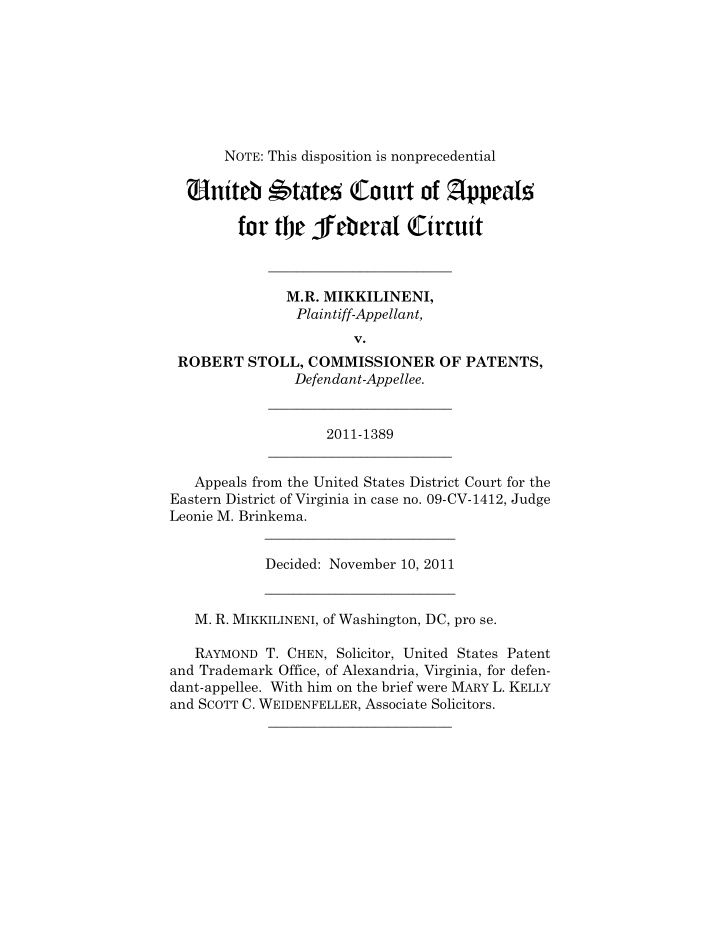



N OTE : This disposition is nonprecedential United States Court of Appeals for the Federal Circuit __________________________ M.R. MIKKILINENI, Plaintiff-Appellant, v. ROBERT STOLL, COMMISSIONER OF PATENTS, Defendant-Appellee. __________________________ 2011-1389 __________________________ Appeals from the United States District Court for the Eastern District of Virginia in case no. 09-CV-1412, Judge Leonie M. Brinkema. ___________________________ Decided: November 10, 2011 ___________________________ M. R. M IKKILINENI , of Washington, DC, pro se. R AYMOND T. C HEN , Solicitor, United States Patent and Trademark Office, of Alexandria, Virginia, for defen- dant-appellee. With him on the brief were M ARY L. K ELLY and S COTT C. W EIDENFELLER , Associate Solicitors. __________________________
MIKKILINENI v. STOLL 2 Before R ADER , Chief Judge , L OURIE , and M OORE , Circuit Judges . P ER C URIAM . M.R. Mikkilineni appeals from the district court’s de- nial of his motion under Fed. R. Civ. P. 60(b)(3) request- ing relief from a final judgment due to alleged fraud by the U.S. Patent and Trademark Office (PTO). Because Mr. Mikkilineni fails to show any evidence of fraud, misrepresentation, or misconduct by the PTO and merely reargues his earlier appeal of the underlying judgment, we affirm. This is the second appeal arising from this case and the background is detailed in Mikkilineni v. Stoll , 410 Fed. Appx. 311 (Fed. Cir. 2011) ( First Appeal ). To sum- marize, Mr. Mikkilineni applied for a patent for a “Method of Inducing Sleep” involving “concentrat[ing] upon principal thoughts to calm mind” and the use of certain devices to aid in the method. The examiner rejected the claims based on the PTO’s Interim Patent Subject Matter Eligibility Examination Instructions (Interim Guidelines) that were issued to aid patent exam- iners in evaluating subject-matter eligibility under 35 U.S.C. § 101. Mr. Mikkilineni filed suit under the Admin- istrative Procedure Act (APA) alleging that the PTO violated 5 U.S.C. § 553(b)-(c) by failing to provide for notice and public comment on the Interim Guidelines. First Appeal , 410 Fed. Appx. at 312. We affirmed the district court’s dismissal of that case. We held that the Interim Guidelines were interpretive rather than sub- stantive and thus did not require notice and public com- ment under the APA. Id. at 313.
3 MIKKILINENI v. STOLL Following our judgment, Mr. Mikkilineni returned to the district court with a motion under Fed. R. Civ. P. 60(b)(3) arguing that the USPTO had obtained the previ- ous judgment based on fraud. The district court denied this motion, holding that Mr. Mikkilineni “fails to meet the clear and convincing evidence standard; instead, he merely repeats the legal arguments that he already presented.” J.A. 2. Further, Mr. Mikkilineni “may dis- agree with the defendant’s legal positions, but that dis- agreement does not establish that a fraud was committed.” Id. Mr. Mikkilineni appeals; we have juris- diction under 28 U.S.C. § 1295(a)(1). Fed. R. Civ. P. 60(b)(3) provides: On motion and just terms, the court may relieve a party or its legal representative from a final judgment, order, or proceeding for the following reasons: * * * * (3) fraud (whether previously called intrinsic or extrinsic), misrepresentation, or misconduct by an opposing party. In reviewing a Rule 60(b) motion, we apply the law of the regional circuit. Amstar Corp. v. Envirotech Corp. , 823 F.2d 1538, 1550 (Fed. Cir. 1987). We review the trial court’s determination for an abuse of discretion. MLC Auto., LLC v. Town of S. Pines , 532 F.3d 269, 277 (4th Cir. 2008). A court abuses its discretion when it “has acted arbitrarily or irrationally[,] . . . has failed to con- sider judicially recognized factors constraining its exercise of discretion, or when it has relied on erroneous factual or legal premises.” United States v. Hedgepath , 418 F.3d 411, 419 (4th Cir. 2005).
MIKKILINENI v. STOLL 4 Mr. Mikkilineni asserts that a number of PTO actions amount to fraud including, among other things, 1) the PTO’s assertion that the correct avenue to challenge the Interim Guidelines was through a direct appeal of a final rejection, 2) the PTO’s characterization of the Interim Guidelines as interpretive rather than substantive, 3) the PTO’s argument that Mr. Mikkilineni asked the courts to rewrite the Interim Guidelines, 4) the PTO’s factual assertion that Mr. Mikkilineni failed to comment on the Interim Guidelines when the PTO voluntarily requested public comment, and 5) the PTO’s final rejection of claims one day after the expiry of Mr. Mikkilineni’s deadline to request Supreme Court review of the First Appeal . Mr. Mikkilineni argues that this fraud entitles him to relief from the district court’s earlier judgment. We agree with the district court that Mr. Mikkilineni fails to show any evidence of fraud. Instead, he reargues the merits of the First Appeal and accuses the PTO of fraud and misrepresentation for disagreeing with his positions. The PTO is correct that Mr. Mikkilineni is free to challenge all of the bases of rejection in a direct appeal and that is the correct route for his complaints. The district court did not abuse its discretion in determining that Mr. Mikkilineni failed to show evidence of fraud, and thus, we affirm. AFFIRMED
Recommend
More recommend